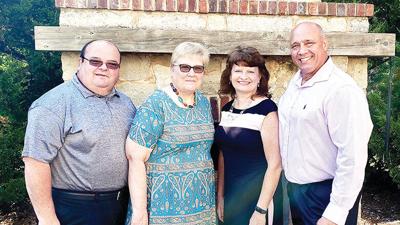This is the second installment in a series about homelessness in the county. It focuses on the organizations that work to help people who are homeless and the barriers, like a lack of affordable housing, that stand in the way of getting people who are unsheltered the help they need.
After half a year of being homeless in Jefferson County, Jeff Wibbenmeyer, an unemployed concrete worker from House Springs, and his girlfriend, Amanda Hobbs, originally from Tyler, Texas, are grateful to be living in an apartment in Arnold. It’s simple and sparsely furnished, but the apartment brings relief from living unsheltered outdoors and sleeping in their minivan.
“We moved back to Jefferson County last June because I felt there would be more help here than in St. Francois County where we were staying at a run-down motel,” Wibbenmeyer said. “After my mother died, she had so many debts her house in Irondale was sold, and we became homeless. Our first night in Jefferson County, we slept in front of the Jefferson-Franklin Community Action Corp. (JFCAC) in Hillsboro, so when they opened we could get help with housing.”
Wibbenmeyer was placed on a wait list for a U.S. Department of Housing and Urban Development (HUD) Section 8 rent voucher. Soon his car was repossessed, and during the hot summer, he became severely dehydrated and spent two days being treated at a hospital. Four months later, after many nights sleeping on a concrete slab behind a restaurant in Hillsboro, he received a rent voucher.
The clock ticked as Wibbenmeyer searched to find an apartment before the voucher expired in 60 days. He filled out applications at HUD apartment complexes across Jefferson County, but the outlook was dim. With no emergency shelter in the county, Wibbenmeyer and Hobbs began sleeping in their minivan, which he had bought for $50, parked behind stores and sometimes at churches.
Along the way, Wibbenmeyer and Hobbs said they received assistance from the Jefferson County Sheriff’s Office Homeless Outreach Team, New Hope Fellowship Church in High Ridge and Faith Community Church in House Springs. They got access to showers and were provided food, clothing and gas for their vehicle, which helped them pull through.
Faith Community paid for one month in a hotel in Arnold. Just as time was running out, an apartment became available.
Wibbenmeyer said he sees a brighter future ahead for him and Hobbs.
He said he is close to getting a well-paying concrete job, though he needs $800 to get reinstated with the local union.
“It’s been a long haul,” he said. “We want to someday give back and work as homeless counselors to help others.”
Lack of affordable housing contributes to homelessness
As Jefferson County officials try to understand the scope of homelessness in the county, those who provide services to homeless people and those at risk of becoming homeless describe a bleak scenario. Besides dealing with people who are chronically homeless, they are seeing families squeezed out of housing as rents increase and older people facing financial burdens that put them at risk of eviction.
A lack of affordable housing in Jefferson County is attributed to a demand that outnumbers the supply.
According to a regional HUD official, JFCAC leased 811 Section 8 apartment units through October 2022. Many more people were on a wait list.
“We have over 4,000 people on the wait list for rent vouchers,” said Janna Bittle, director of housing for JFCAC, at the Jan 19 Jefferson County Homeless Coalition meeting. “We always give preference to homeless families. The largest hindrance is trying to find units for families.”
As people are displaced from their homes, it creates a domino effect of lost resources.
The Jefferson County Homeless Coalition, made up of representatives from about 40 organizations, meets monthly to deal with crises, pool resources, plan outreach events and discuss trends in homelessness. The partnership program also aims to raise awareness throughout the county.
Dawn Kaufman of Nurses for Newborns-Missouri attended the meeting and said there’s a need for apartment furniture and baby supplies for a pregnant woman whose baby is due in early March. The woman had been living under bridges from Jefferson County to North St. Louis County.
“Her first prenatal visit was last week,” Kaufman said. “We put her up in a hotel for three and a half weeks, and she was at Salvation Army for a week. She’s in an apartment now, but she needs everything.”
Groups work together to help the homeless
“It is logical to deal with homelessness through a community collaborative group because it truly takes a village,” said Sue Curfman, Comtrea’s president and CEO. “If you look at the entire scope of services needed to successfully transition an individual experiencing homelessness to be at their full capacity, it takes all of this. Homelessness is so complex, and the Homeless Coalition helps to make it a bit less daunting.”
As cold weather began, the Homeless Coalition looked at how to fund short-term hotel stays for homeless people. Jefferson County has no emergency or transitional shelter to aid those living unsheltered when extreme weather hits the area.
“We wanted to provide a central place to collect donations that could be earmarked for unhoused funds through Mercy Health Foundation Jefferson, our internal charitable organization,” Alicia Evans of Mercy Hospital Jefferson said. “We’ve just begun taking donations that will benefit the unhoused through our community health team by helping provide temporary shelter to those in need.”
Despite these goodwill measures, some people who are chronically unsheltered or homeless resist receiving aid.
“About 25 percent of the homeless people I’ve encountered are unwilling to receive help and are content with the lifestyle,” said Cpl. Drew Crews of the Sheriff’s Office Homeless Outreach Team. “For some, mental illness, drug use and criminal history hinders their understanding of how to help themselves. They don’t know where to find the resources they need.”
Linda Martinson, along with her husband, Alan Martinson, and Kevin and Linda Hemmer of the homeless outreach program 25:35 Ministries, serve about 150 to 200 unsheltered homeless people each month. Volunteers travel a regular route every Thursday that starts in Jefferson County and goes to St. Louis to deliver snack bags, food and supplies, like clothing, blankets, sleeping bags and propane.
“Although we have known some of the people on our route for several years, we often can’t find the homeless in Jefferson County. A lot of them don’t want to be found,” Martinson said.
Limited public transportation in Jefferson County makes it challenging for some people experiencing homelessness to reach help.
“Transportation is a huge barrier in Jefferson County, especially along the Hwy. 30 corridor,” said Jillian Bissell of the Jefferson County Health Department. “Our quarterly Homelessness and Essential Needs Outreach Events are an effort to serve areas throughout Jefferson County.”
The Jefferson Foundation, founded in 2013 with more than $153 million from the sale of Jefferson Regional Medical Center, helps to support a wide range of charitable organizations throughout the county. In 2022, the foundation awarded grants to area food pantries, thrift stores and charities that help domestic violence victims and teens who are homeless or at risk of becoming homeless.
In addition, the Foundation provided grants totaling $136,992 to organizations that help people who are homeless with housing, including Salvation Army’s Arnold Corps’ emergency services program; St. Patrick Center’s housing program for veterans in Jefferson County; six parishes and conferences of the Society of St. Vincent de Paul’s rent assistance and emergency housing programs; and Finding Grace Ministries’ drop-in and transitional housing program in Arnold.
Doreen Page, executive director of Finding Grace Ministries, said that organization started in 2014 focusing on sex trafficking prevention to help youth and adults who are homeless.
“Youth is our priority. We want to help kids who are sleeping on other kids’ couches,” she said. “Sex trafficking is everywhere. Poverty and homelessness are the biggest variables that put teens and young adults in harm’s way. When you are homeless and need rides, your phone charged, meals and a place to sleep, it opens you up to those who prey on women.”
Page realized the need for a drop-in center for homeless people and opened the Harbor in 2019. It provides a place to shower, launder clothing and receive supplies. An incentive program helps with jobs and provides transportation with a one-week stay in a hotel until the first paycheck is received.
Page said she also works with her Homeless Coalition partners to help clients get mental and physical screenings.
Finding Grace Ministries’ transitional living center is currently being renovated, though additional funding of $70,000 is needed before the center can open in summer 2023. The facility will house up to 22 people, including eight youth in a dorm-style setting and adjoining rooms for families who have fallen on hard times, Page said.
Linda Schroeder, president of the Peace Pantry in Cedar Hill, said the organization is seeing a rise in the number of people who need help with housing.
“We are seeing 27 percent more families living below the poverty level. I am mostly concerned about the elderly homeless in Jefferson County. Some are people who have worked their entire lives and now cannot pay their bills and are fearful of being evicted.
“A 56-year-old grandmother lost her job over Christmas to care for her 5-year-old grandchild. Now, they stay in her car until housing is available. An 80-year-old woman with Parkinson’s disease worked 22 years as a paramedic in the county and is close to losing everything.”
The Peace Pantry recorded 38,222 individual visits in 2022, Schroeder said. Its thrift store also had a brisk business.
“Some of our clients are the poorest of the poor,” she said.
The Free Store housed in the Life Church-De Soto helps about 500 people, said Jamie Drye, who founded the thrift store in 2010.
On Jan. 11, the store gave away 1,410 items, and a Caring Cabinet is stocked with snacks provided by the local Elks Lodge for 10 homeless men who come in every other week, she said.
“We have homeless bags with toiletries prepared for them,” Drye said. “They always just take what they need. I don’t ask questions about where they stay, though I know some live in their vehicles. I ask them if they’ve eaten today, and if they haven’t, I go to the Caring Cabinet.
“I want to help as many people as I can, but we need to find the root of the problem for people on drugs and alcohol and those who have mental illness to break the homeless cycle.”
Click through to see all stories in this series related to homelessness in Jefferson County:
Click through to see all three stories in this series related to homelessness in Jefferson County.






